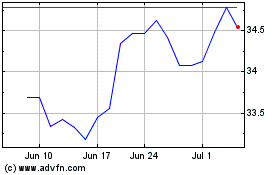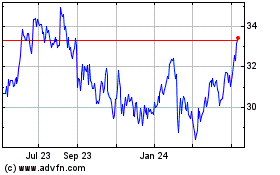By Keach Hagey and Erich Schwartzel
This article is being republished as part of our daily
reproduction of WSJ.com articles that also appeared in the U.S.
print edition of The Wall Street Journal (June 21, 2018).
Walt Disney Co. raised its offer to purchase most of 21st
Century Fox to more than $71.3 billion in cash and stock, topping
an unsolicited offer from rival Comcast Corp. and escalating the
bidding war for the coveted media properties.
Disney's new offer is far higher than its original deal, $52.4
billion in stock, and surpasses Comcast's all-cash offer of roughly
$65 billion. In addition to having the higher offer, Disney said it
also has a regulatory advantage over Comcast in winning a company
to help it fight back against new-media competitors like Netflix
Inc.
Fox, in a news release, said the new Disney deal "is superior to
the proposal" made by Comcast earlier this month. A Comcast
spokeswoman had no immediate comment.
Disney and Comcast are battling for prized media assets
including the Twentieth Century Fox film and TV studio; U.S. cable
networks FX and regional sports channels; international assets such
as Sky PLC and Star India; and Fox's one-third stake in the
streaming serviceHulu.
Fox and Disney were negotiating terms of an amended agreement
over the weekend and had the outlines of a deal by Tuesday, though
they were nailing down details like the mix of cash and stock, a
person close to the situation said.
Disney submitted its bid Wednesday ahead of a Fox board meeting
in London, another person familiar with the situation said. Fox
Executive Chairman Rupert Murdoch and Disney Chief Executive Bob
Iger met to discuss the new pact.
Disney agreed to pay Fox shareholders roughly 50% in cash and
50% in stock. If the current deal closes, Fox shareholders would
own 19% of the combined company, compared with 25% under the old
deal.
Some observers have said it might make sense for Disney and
Comcast to divide the Fox assets between themselves rather than go
through a bidding war, but Mr. Iger said the idea of splitting the
businesses is a nonstarter. "We have an agreement in place with
[Fox] that precludes that," he said on a conference call
Wednesday.
Disney also has time on its side, Mr. Iger said, because its
deal with Fox has been through several months of regulatory review.
"We believe that we have a much better opportunity, both in terms
of approval and the timing of that approval, than Comcast does," he
said.
The CEO also highlighted how Fox's programming would boost his
company's efforts to launch a Disney-branded streaming service next
year and compete directly with Netflix. "Direct-to-consumer
distribution has become an even more compelling proposition in the
six months since we announced the deal. The consumer is voting --
loudly," he said.
The fight for Fox is part of a scramble by media, telecom and
cable companies to get bigger as technology-industry superpowers
disrupt old ways of doing business.
Neither proposed deal includes Fox News, Fox Sports 1, the Fox
broadcast network or its television stations. In either scenario,
those assets would be spun off into a new company, for the moment
dubbed "New Fox."
On a per-share basis, the new Disney deal values the Fox assets
being acquired at $38 a share, compared with Comcast's offer of $35
and Disney's original offer of $29.54, based on the last trading
day before it was announced. On Wednesday, Fox's Class A shares
rose 7.5% to $48.08, and Comcast shares added 1.8% to $33.39.
Disney shareholders didn't appear to mind stomaching the higher
price as the stock rose 1% to $107.15. Some analysts said the move
was foolish. "We didn't like the deal at the prior price, and we
like it substantially less now," said Doug Creutz of Cowen &
Co. The analyst said a Disney-Fox tie-up isn't the way to win the
direct-to-consumer fight.
A continuing bidding war between Disney and Comcast could be a
strain on both companies' balance sheets. Disney Chief Financial
Officer Christine McCarthy said the company no longer expects to
complete a $20 billion share repurchase announced with the initial
deal in December.
Moody's placed Disney on review for a credit-rating downgrade on
Wednesday, citing its discomfort with how long it would take Disney
to return to investment-grade leverage. S&P Global Ratings said
it could lower its ratings on Disney by up to three notches
depending on the final deal.
Fox's board and shareholders have had to weigh a number of
factors as they measure the offers, including their structure. More
stock in the deal has tax advantages for Fox shareholders. These
tax advantages might be particularly large for Fox shareholders,
such as the Murdoch family, who have held Fox's stock for a long
time and thus face a potentially large capital gain to pay taxes on
if it is sold for cash. Mr. Murdoch and his family have a 17%
economic interest in 21st Century Fox. 21st Century Fox and Wall
Street Journal-parent News Corp share common ownership.
Disney said the stock portion of the deal is expected to be
tax-free to 21st Century Fox shareholders. Other shareholders,
particularly the large institutional shareholders that are Fox's
biggest investors, may care less about taxes.
Disney's introduction of cash into its latest bid would mean
that the spinoff of New Fox was no longer tax-free to shareholders,
as it had been in its previous all-stock deal, according to
independent tax analyst Robert Willens.
"The deal on the table has one negative, and that is that, with
New Fox, all the shareholders have to pay a tax," said Mario
Gabelli, chairman and CEO of Gamco Investors, which owns Fox stock.
However, he added, "that was the same as the Comcast bid," which
was all-cash.
Because of the new Disney offer, Fox postponed the special
meeting of shareholders it had originally scheduled on July 10 to
"a future date."
Disney's offer puts a "collar" on the stock portion, saying Fox
shareholders would receive Disney shares equal to the $38 price so
long as Disney's stock price is between $93.53 and $114.32.
Regulatory hurdles have been a consideration. The Justice
Department would have to sign off on either deal, and Fox cited
regulatory concerns among its reasons for rebuffing Comcast's
initial approach.
However, last week, a judge struck down the Justice Department's
attempt to block AT&T's acquisition of Time Warner Inc. Comcast
believes the court's approval of a "vertical" merger between a
distributor and a content company should nullify Fox's regulatory
concerns, since a Comcast-Fox tie-up would have similar
characteristics, people close to the cable giant say.
Mr. Iger said Wednesday that he still believed a "vertical"
merger of the kind Comcast proposed for the Fox assets faced
regulatory headwinds.
--Austen Hufford and Dana Mattioli contributed to this
article.
Write to Keach Hagey at keach.hagey@wsj.com and Erich Schwartzel
at erich.schwartzel@wsj.com
(END) Dow Jones Newswires
June 21, 2018 02:47 ET (06:47 GMT)
Copyright (c) 2018 Dow Jones & Company, Inc.
Fox (NASDAQ:FOXA)
Historical Stock Chart
From Mar 2024 to Apr 2024

Fox (NASDAQ:FOXA)
Historical Stock Chart
From Apr 2023 to Apr 2024
